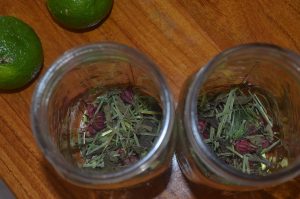Our signature tea made from the edible landscaping in Saint Michael’s.
It contains calyxs from cranberry hibiscus, tulsi basil leaves, lemon grass, and mandarin lemons.
Once we add the limes after steeping the mix, it will turn the tea from brown to a translucent ruby color.

Cancer Fighting Herbs
These organic regenerative herbs are traditionally taken: to lower blood pressure, reducing blood viscosity (reduction in cholesterol levels), Hibiscus contains flavonoids and anthocyanins, which have antioxidant properties and have been shown to support heart health. Hibiscus tea has also been used traditionally to treat coughing and poor appetite, and it has been used for its antibacterial and antifungal properties. In addition, drinking hibiscus tea may help with digestive orders, such as an upset stomach, as it can help relax the smooth muscle of the intestine. Tilo, J. pectoralis have estrogenic, progestagenic and anti-inflammatory effects, and thus have a plausible mechanism of action, explaining its traditional use for menopause and PMS.
Justicia pectoralis Jacq. (Acanthaceae), an herbal medicine used in Costa Rica (CR) for the management of menopausal symptoms and dysmenorrhea.
(http://www.ncbi.nlm.nih.gov/
Lemongrass contains antioxidants, flavonoids and phenolic compounds such as luteolin, glycosides, quercetin, kaempferol, elimicin, catecol, chlorogenic acid, and caffeic acid, all of which help in providing an impressive range of medicinal aids. The main component of lemongrass is lemonal or citral, which has anti-fungal and antimicrobial qualities.

Detoxification
Lemongrass helps in cleansing and flushing harmful toxic wastes out of the body, as a result of its diuretic properties. Detoxification helps in better regulation of various organs of the body, including the liver and kidney, while also helping to lower the levels of uric acid. The diuretic effect of lemongrass helps in increasing the quantity and frequency of urination, which helps in maintaining digestive health, eliminating accrued fats, and assisting in maintaining a clean system.
Lemongrass and Cancer
Lemongrass is effective in treating various types of cancers without affecting the healthy normal cells of the body. Research conducted to prove the anti-cancerous activity of lemongrass has shown promising outcomes in the prevention of skin cancer. Studies have shown that a certain component, citral, which is present in lemongrass, helps in inhibiting the growth of hepatic cancer cells during the initial phases and prevents any further production of cancerous cells. Another study has provided supporting evidence regarding the anti-proliferative effect of citral in impeding the growth of human breast cancer cells and the induction of apoptosis.
Staphylococcus Aureus
Studies have shown that lemongrass essential oil has an anti-biofilm capacity and is beneficial against the infection caused by Staphylococcus aureus. Lemongrass contains phenols which possess the capability to spread quickly through the body tissues and cure biofilms located anywhere in the body. Lemongrass disrupts the growth and communication of germs which helps in inhibiting the formation of biofilms. The essential oil of lemongrass is useful for application both topically as well as internally in the diseases diagnosed with biofilms, such as Lyme disease.
Stomach Disorders
Studies have shown that lemongrass essential oil has anti-microbial and anti-bacterial properties which help in fighting the infections caused by various pathogens such as Helicobacter pylori and Escherichia coli. Lemongrass is beneficial in the prevention of gastrointestinal disorders such as gastric ulcers, helps in stimulating the bowel function, and improves digestion. The anti-inflammatory properties of lemongrass are beneficial for treating constipation, ulcerative colitis, diarrhea, nausea and stomach aches.
Insomnia
Lemongrass aids in calming the muscles and nerves which help in inducing deep sleep. Research has shown that lemongrass tea has sedative and hypnotic properties which help in increasing the duration and quality of sleep.
Respiratory Disorders
Lemongrass is widely used in Ayurvedic medicine for its healing effects in treating coughs and colds. Along with other beneficial components, the vitamin C content present in lemongrass helps in providing relief from nasal blockages, flu and other respiratory disorders such as bronchial asthma.
Fever
Lemongrass is a febrifuge and is also known as the ‘fever grass’, owing to its beneficial effects in lowering fevers. The antipyretic and diaphoretic effect of lemongrass is extensively used in Ayurvedic medicine for curing fevers by inducing sweating.
Infections
Lemongrass works as an antiseptic and is effective in treating infections such as ringworm, sores, Athlete’s Foot, scabies, and urinary tract infections because of its antimicrobial and anti-fungal properties. Studies have shown that lemongrass exerts healing effects on dermatological infections, such as yeast infections, by inhibiting the growth of pathogens. Another study provided supporting evidence that demonstrated the efficacy of lemongrass over thyme, patchouli and cedar wood oil in the treatment of various diseases such as oral or vaginal candidiasis.
Aches
Lemongrass helps in alleviating the pain and discomfort caused by headaches and migraines due to its analgesic properties. The phytonutrients present in lemongrass improve the blood circulation and help in relieving spasms, muscle cramps, sprains, and back aches. Lemongrass is valuable in treating sports wounds, including dislocations, internal injuries and bruises.

Nervous System
Lemongrass is a nervine and has been proven to be an excellent tonic for the nervous system. It stimulates the mind and helps in combating convulsions, nervousness, vertigo and various neuronal disorders such as Alzheimer’s and Parkinson’s disease. Lemongrass is used in therapeutic baths, which assist in calming the nerves and help in alleviating the symptoms of anxiety and fatigue caused by stress.
Type-2 Diabetes
Lemongrass has been proven beneficial in treating Type-2 diabetes. Studies have shown that the citral present in lemongrass helps to maintain optimum levels of insulin and improves the tolerance of glucose in the body.
Rheumatism
Lemongrass is effective in relieving the pain and discomfort caused by rheumatism. It can be applied topically on both lumbago and sprains and helps in relieving neuralgia and other painful sufferings.
Immune System
Lemongrass helps in restoring the vital systems which are operational in the body, including digestion, respiration, excretion and nervous system. This assists in the better absorption of nutrients and strengthens the immune defense mechanism of the body. Lemongrass extracts have a beneficial effect on the inflammatory actions of cytokines, which are the signaling molecules through which the cells communicate and respond in the body. Studies have shown that lemongrass exerts anti-inflammatory action and its constituents such as citral may be the cause behind its inhibitory effects on cytokine production.
Skin Care
Lemongrass has been treasured as a skin tonic and makes an effective cleanser for oily or acne-prone skin, due to its astringent and antiseptic qualities. It helps in strengthening the skin tissues and toning up the pores while also sterilizing them. Care should be taken while using lemongrass products, as the undiluted application might lead to dermal irritation in some cases.
Cellular Health
Lemongrass possesses antioxidant qualities and helps in protecting the body cells from the oxygen-derived free radicals. It also helps in the cleansing of blood and strengthens the spleen to discard the tarnished red blood cells. It supports the function of the thymus glands which helps to produce white blood cells. Lemongrass helps in stimulating regeneration of cells. The folate and potassium content in the stem and leaves of lemongrass aids in DNA synthesis and promotes cell division.
Edema
Lemongrass is effective in curing the condition of water retention or edema. It has a cleansing effect on lymphatic congestion and helps to soothe the swelling.
Aromatherapy
Lemongrass consists of the beneficial ingredients of essential oils such as nerol, citronellol, myrcene, dipentene, geraniol and methyl heptenone which possess anti-fungal, insecticidal and antiseptic properties. Lemongrass oil is extensively used in aromatherapy, due to its therapeutic effects, which help in revitalizing and refreshing the body. The cooling effect of lemongrass oil is beneficial for the body during hot weather and promotes the revival of both the mind and soul. Lemongrass oil possesses natural astringent and toning qualities which help in stimulating blood circulation and tones up the dermal tissues. It also helps in tightening, uplifting and firming lethargic or sagging skin.
Lemon Grass Infographic Obesity
Lemongrass contains citral, which has been proven to be effective in combating obesity. It prevents the accumulation of abdominal fat and promotes the use of stored energy, which helps in preventing diet-induced weight gain. It aids in healthy metabolism and enhances the oxidation of fatty acids in the body.
The Tulsi (holy) Basil is one of most used medicinal herbs in Ayurvedic medicine. The Holy Basil (Ocimum sanctum) is frequently prescribed by Ayurvedic Physicians for: Stress and anxiety, Coughing and asthma, Intestinal issues and diarrhea, fevers, arthritis, Eye problems,u lcers, heart and artery conditions, back pain, skin conditions, ringworm,various bites from insects, snakes, scorpions and others and malaria. Tulsi could be an article on it’s own. Give me a little time and it will be.

ecovillagecostarica
Anonymous
Anonymous